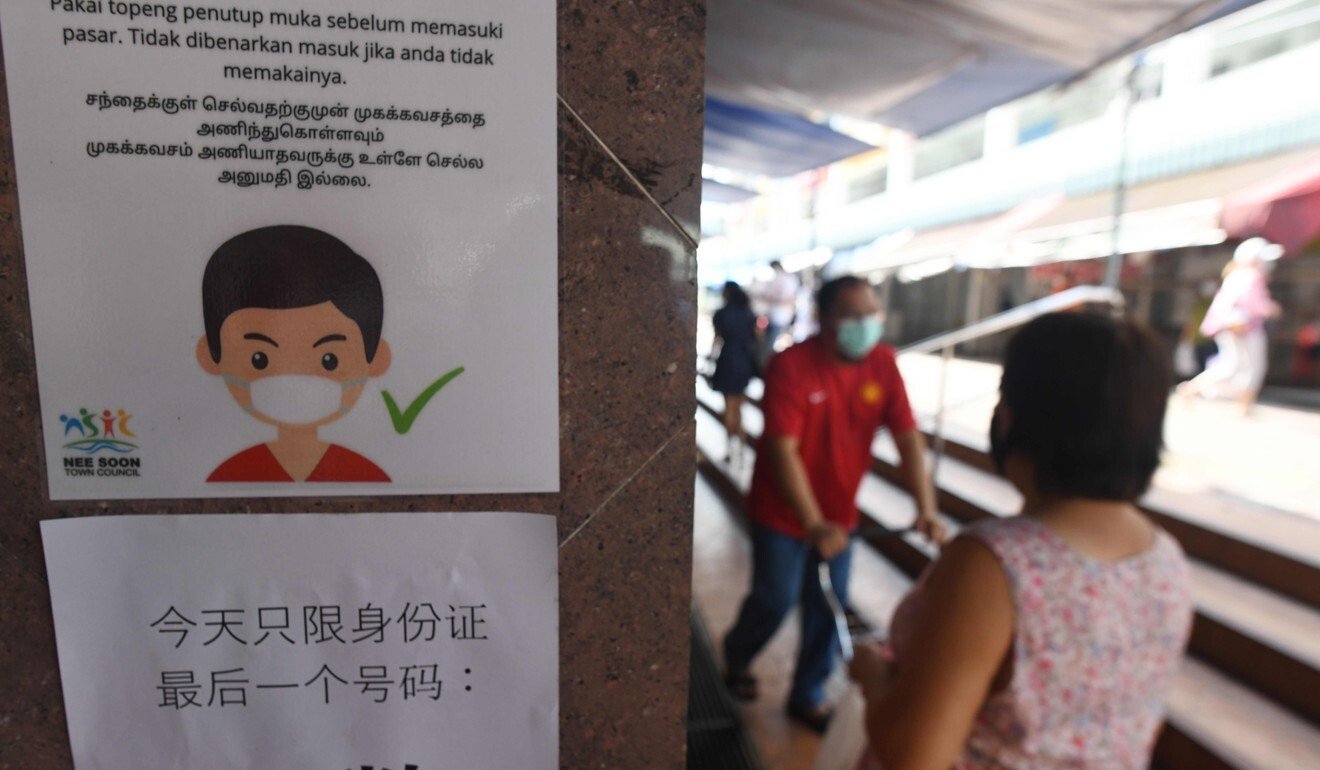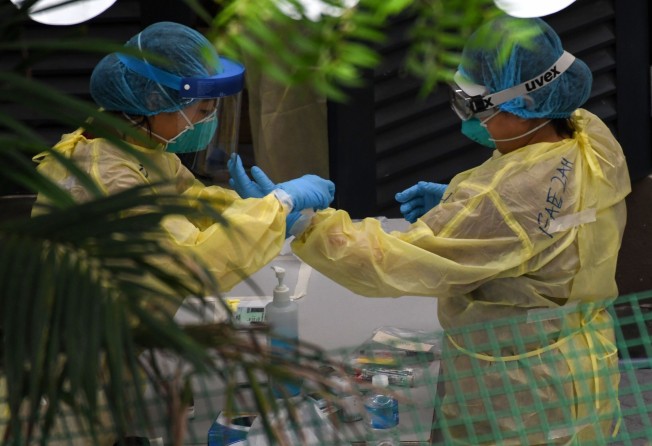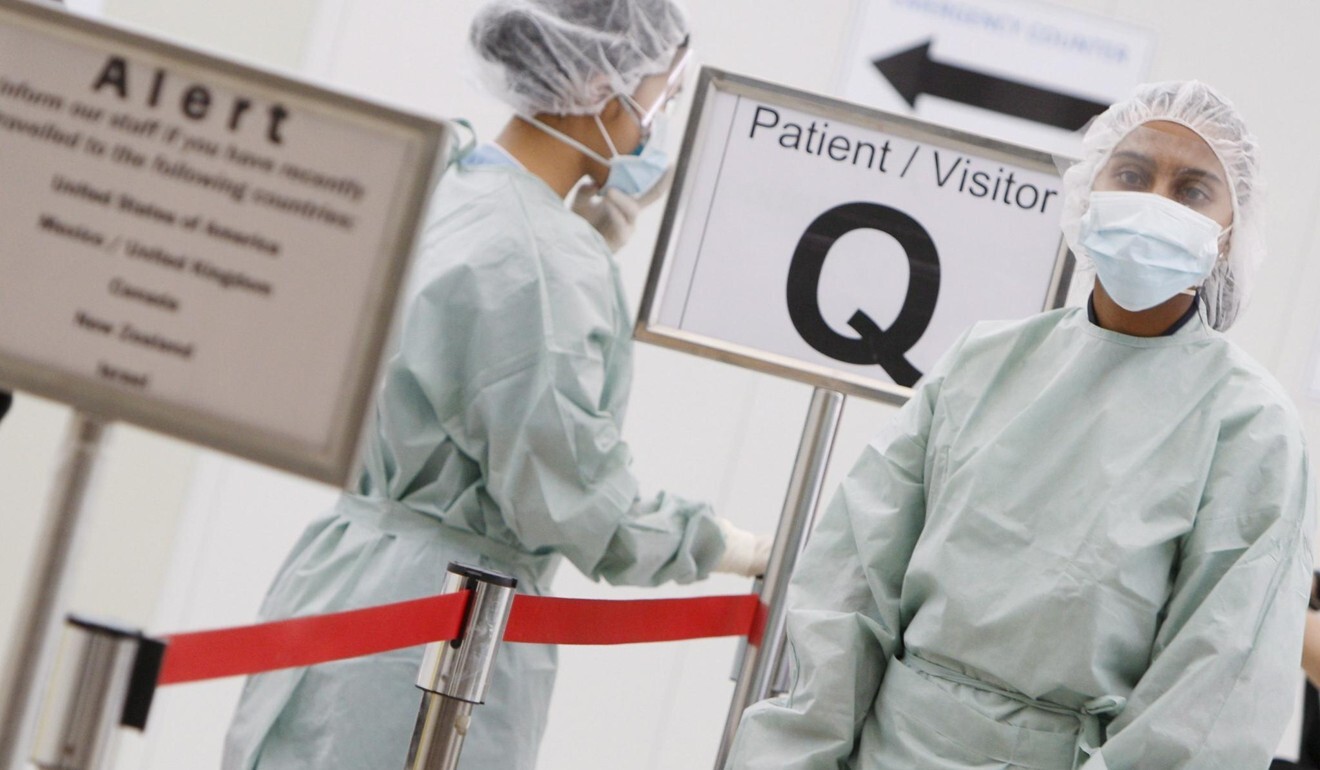
In Singapore, for one virus veteran Covid-19 gives sense of déjà vu
- In her 19 years working as a cleaner at Singapore General Hospital, Malaysian Nurul Aisyah, 59, has been on the front lines of three viral outbreaks
- She did not leave her post during 2003’s Sars epidemic, nor when swine flu swept through the city state in 2009 – and she says Covid-19 is no different

In her 19 years working as a cleaner at Singapore General Hospital, Malaysian Nurul Aisyah has found herself on the front lines of three viral outbreaks.
First came severe acute respiratory syndrome in 2003, then swine flu in 2009 and now the ongoing coronavirus pandemic.
While Covid-19 is undoubtedly the most consequential of the three globally, it has given 59-year-old Aisyah a sense of déjà vu. Sars was also a coronavirus, and though it was less contagious, it did infect 238 people in the city state and cause 18 deaths.
When swine flu, officially called influenza A (H1N1), swept through Singapore it infected more than 400,000 people and killed 18.

So far, Covid-19 has infected 17,101 people in the city state, with 16 deaths.
Despite pleas from her family in Malaysia to return home, 59-year-old Aisyah remains determined to perform her duties and help keep patients safe.
Many of her colleagues from the same cleaning company quit their jobs during past outbreaks out of fear of infection, but she has been resolute in her determination to continue.
Even when her mother and four grown children begged her to return to their home in Johor Baru after Singapore’s Covid-19 cases soared in March, Aisyah was firm in saying no to their pleas.
My mother called me every day on the phone, crying and begging me to go back
“My mother called me every day on the phone, crying and begging me to go back. I said, ‘Mother, I love you and I will return one day, but now is not the time’,” she said.
“If I go back now, my heart feels no good. Who is going to take care of these patients?”
Aisyah, a grandmother of four, could well choose to retire as her children, aged between 25 and 39, are self-sufficient. She has other reasons to return home, too – her 81-year-old mother, who lives in Pahang, has been battling stomach cancer for the past six years.
Yet in times of crisis and confusion, Aisyah’s priorities have remained clear: she puts the patients first.
“During Sars, many of my friends ran away because they were scared. They said to me, ‘Eh, faster lah, let’s go back’. They kept telling me stories to make me afraid, but I was not scared. If everyone runs away, who will be here to care for the patients?” she said.
Valiant as she sounds, Aisyah said she draws confidence from following protocols, such as wearing personal protective equipment and washing her hands regularly, which has enabled her to survive working in a high-risk environment.
“As long as you put on goggles, wash your hands after returning from the patients’ room and follow the steps, nothing will happen. There’s no need to worry,” she said.
For the past 15 years, Aisyah has been working on the hospital’s “Ward 48” – designated for cancer patients. She usually works from 7.30am until 3.45pm, but is sometimes on duty until as late as 9.30pm if her supervisor requires assistance.

As a cleaner, her duties include keeping the ward’s toilets, beds and rooms spick and span. But tending to cancer patients is not an easy feat, she said, as they often have difficulty controlling their bowels.
Even at lunch, Aisyah will get calls from patients to help. Once, a patient left a trail of faeces from the toilet to his bed.
“I quickly mopped the floor, but after seeing that, I couldn’t continue eating any more,” she said.
“After I cleaned up, the patient was very happy. He kept saying ‘thank you’ to me. I felt very good. Whenever patients say ‘thank you’, I feel like doing more for them.
If I go now, who will want to take care of the patients?
“But after a few minutes, I got called again to do some more wiping. Sometimes, when I think of this, I laugh. Sometimes, I feel very sad. I know they don’t want this to happen.”
Knowing that the patient felt bad, Aisyah told him that she would help out no matter how many times he called. To her surprise, he then clasped his palms together and started thanking her in a manner that left her feeling greatly appreciated.
“My heart felt so good. I felt that God was arranging everything, for me to be here,” she said.
As well as the patients, Aisyah said the rapport she has established with other workers in the hospital is what has kept her going.
“I want to take care of the patients more, because I know they love me. I work so hard already and for so many hours, but I never think about how difficult it is,” she said.
“I know the patients, staff nurses and doctors love me. When doctors greet me ‘good morning, Nurul Aisyah’, my heart is so happy. I am just a housekeeper.”
Aisyah said it was this sense of commaraderie that was preventing her from returning to Johor Baru.
“I am not scared of Covid, I was also not scared of Sars. Now I don’t want to return because why? Now I have to care for the patients by mopping and cleaning,” she said.
“If I go now, who will want to take care of the patients?”
Amid the coronavirus pandemic, Aisyah has to clean more often – twice as much as was required under her usual schedule.
Having to wear protective equipment for eight hours a day is tiring and fasting during the holy month of Ramadan has meant that she has to get up by 5am every day to pray and eat.
“Sometimes, when my children call, I cannot answer the phone because I am so tired, but I don’t want to tell them. I am very tired, but I am still not scared,” she said.
Since her children are all adults, Aisyah said she is not working out of financial need, but out of a desire to serve the patients.
“I told my patients even if you vomit or [defecate] 10 times, I will come and clean up. Don’t worry, this is our job. Ten times you call me, 10 times I will come.”
Read the original at Today Online